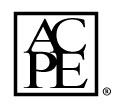| DOWNLOAD SCHEDULE » | DOWNLOAD EVAL TEMPLATE » | CE INSTRUCTIONS » | REQUEST PARKING » | MAP & DIRECTIONS » |
|
|
ARB 304
|
ARB 305
|
ARB 354
|
ARB 355
|
|
SESSION 1
1:00 – 1:45 pm
|
Alicia Yn, Pharm.D.
Axicabtagene ciloleucel versus Tisagenlecleucel for Relapsed/Refractory Diffuse Large B-cell Lymphoma
|
Kelsey Sachtleben, Pharm.D.
Evaluating the use of direct oral anticoagulants in thrombophilic disorders
|
Ashleigh Wallace, Pharm.D.
Aspirin for the Primary Prevention of ASCVD
|
Dan Ilges, Pharm.D.
Long-Acting Lipoglycopeptides for Osteomyelitis
|
|
1:45 – 1:55 pm
|
Travel Time to accommodate movement between rooms
|
|||
|
SESSION 2
1:55 – 2:40 pm
|
Cassandra Hacker, Pharm.D.
Use of Venetoclax in Treatment of Acute Myeloid Leukemia
|
Rachel Kiehne, Pharm.D.
The Use of Anticoagulation in Patients with Peripheral Artery Disease
|
Ara Gharabagi, Pharm.D.
Polycystic Kidney Disease: Updates in Therapeutics and Management
|
Kimberly Johnstone, Pharm.D.
Peripherally Acting Mu-Opioid Receptor Antagonists (PAMORA) for the treatment of Opioid-Induced Constipation in pediatric patients
|
|
2:40 – 2:50 pm
|
Travel Time to accommodate movement between rooms
|
|||
|
SESSION 3
2:50 – 3:40 pm
|
John Talili, Pharm.D.
The use of Erythropoiesis-Stimulating Agents in the Setting of Cancer-Associated Anemia
|
Emily Frye, Pharm.D.
Reversal Strategies for Direct Oral Anticoagulants
|
Daniel Elliott, Pharm.D.
Pharmacologic Management for Postoperative Vasoplegic Syndrome
|
Jami Cain, Pharm.D.
Bravo for Spravato? A unique approach for treatment-resistant depression
|
Click here for a printable copy of the schedule
Registration is free, but is required in advance. Due to limited space, only those participants who register before 12:00 PM on Wednesday, November 13, 2019 will be able to request parking access on campus.
To request parking, please first register for your desired sessions. Then, complete the parking questionnaire using the link above, or by clicking here », to complete your parking request. If you do not request parking on our campus, or if you do not submit your requst by the deadline, you will be re-directed upon arrival.
Paper copies of handouts will be provided in each room as well as electronically on this website. Copies of PowerPoint slides are not provided. To access the handouts electronically, participants should ensure they are logged in before accessing this event. Click the + symbol beside the session, which will expand the module. A clickable text link to download the handout as a PDF file will be present.
ATTENDANCE
All participants will be required to sign in on the paper sheets, located within each room. Paper sign-in sheets will be reconciled against electronic credit reporting on this website. Sessions you did not attend will be removed from your account within two weeks following the seminars.
CPE CREDIT
Participants must claim all CPE credit electronically. Participants may claim no more than one 45-minute session for each time block. To do so, participants must complete an online evaluation for those sessions attended no later than two weeks following the sessions. Participants must be logged on and registered in order to view and complete the evaluation(s). Only ONE session may be claimed for each time block. If multiple concurrent sessions are claimed, or if a session is claimed that is not reflected on the paper sign in sheets, the offending participant forfeits CE credit.
SPECIAL ACCOMMODATIONS
Attendees of all abilities are welcome to participate. If you require reasonable accommodations, please notify us in advance so that we may secure resources as soon as possible. Every effort will be made to make accommodations where necessary.
Date: Nov 22, 2019 01:00 AM - 04:00 AM
Fee
CE Hours
Activity Type
- Knowledge
Target Audience(s)
- Pharmacists
Accreditation(s)

|
St. Louis College of Pharmacy at the University of Health Sciences and Pharmacy in St. Louis is accredited by the Accreditation Council for Pharmacy Education as a provider of continuing pharmacy education. To learn more about the specific program information, including universal activity numbers (UAN's) and learning objectives, please expand the modules below. Following successful completion of an evaluation, CE credit will be automatically reported to NABP through the CPE Monitor system, using the NABP ePID numbers and date of birth (MMDD) stored in participants' user profiles. Follow this link to learn more about CPE Monitor and the credit reporting process » Participants are responsible for ensuring receipt of credit; no credit can be corrected or awarded if more than 60 days have passed from the date of the event or if the home study is expired.
It is the policy of St. Louis College of Pharmacy at the University of Health Sciences and Pharmacy in St. Louis, to ensure balance, independence, objectivity and scientific rigor in all its educational programs. All faculty participating in this program are expected to disclose to the program audience any real or apparent conflicts of interest related to the content of the presentation.
|
Speaker(s)/Author(s)
|
Alicia Yn, Pharm.D. |
Activity Number
0033-0000-19-126-L01-PCE Hours
Location
Speaker(s)/Author(s)
|
Kelsey Sachtleben, Pharm.D. |
Activity Number
0033-0000-19-127-L01-PCE Hours
Location
Speaker(s)/Author(s)
|
Ashleigh Wallace, Pharm.D. |
Activity Number
0033-0000-19-128-L01-PCE Hours
Location
Speaker(s)/Author(s)
|
Daniel Ilges, Pharm.D. |
Activity Number
0033-0000-19-125-L01-PCE Hours
Location
Speaker(s)/Author(s)
|
Cassandra Hacker, Pharm.D. |
Activity Number
0033-0000-19-124-L01-PCE Hours
Location
Speaker(s)/Author(s)
|
Rachel Kiehne, Pharm.D. |
Activity Number
0033-0000-19-122-L01-PCE Hours
Location
Speaker(s)/Author(s)
|
Ara Gharabagi, Pharm.D. |
Activity Number
0033-0000-19-130-L01-PCE Hours
Location
Speaker(s)/Author(s)
|
Kimberly Johnstone, Pharm.D. |
Activity Number
0033-0000-19-123-L01-PCE Hours
Location
Speaker(s)/Author(s)
|
John Talili, Pharm.D. |
Activity Number
0033-0000-19-129-L01-PCE Hours
Location
Speaker(s)/Author(s)
|
Emily Frye, Pharm.D. |
Activity Number
0033-0000-19-121-L01-PCE Hours
Location
The overall goal for the audience is to understand the disease state/risk factors and pharmacologic options for post-operative vasoplegic syndrome treatment.
Speaker(s)/Author(s)
|
Daniel Elliott, Pharm.D. |
Activity Number
0033-0000-19-120-L01-PCE Hours
Location
Speaker(s)/Author(s)
|
Jami Cain, Pharm.D. |
